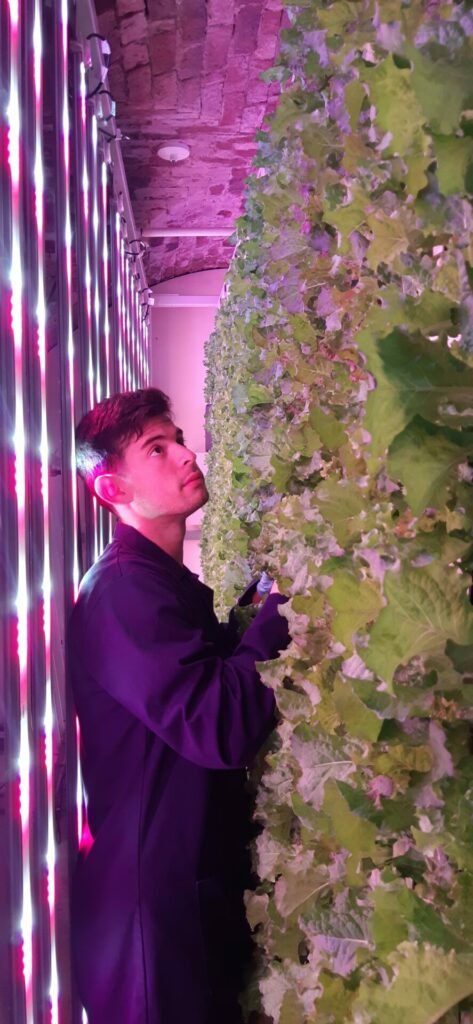Did you know that there’s a farm growing fresh salad and herbs directly below our city? That’s right… There’s lettuce growing underneath our feet!
Liverpool Food Network member Sebastian Linares is a young entrepreneur who’s passionate about vertical farming, and he’s currently working alongside the team at Farm Urban in the Baltic Triangle to discover more about his passion for growing sustainable produce.
“When you think of the vegetables, herbs, and fruits you consume at home, like lettuce, arugula, basil, or strawberries, do you ever think about where it comes from? Or how was it grown? These are critical questions to answer when it comes to supplying the needs of the British population, and we need to find solutions if we are going to meet those needs in a sustainable way.”

Traditionally crops are grown using land – a lot of it. Add to this the use of pesticides to protect the food being grown, heavy machinery for soil tilling, and of course having the right environmental conditions and you can see why this method is not sustainable.
“As the population grows, land itself becomes scarce, and the only way to get more arable land is through deforestation, an action that has already created too many environmental issues for the planet. In the UK, we have seen first-hand how supply chain issues created disruptions and an increase in prices of products being imported to the country, so depending on neighbouring countries with the right weather to grow crops such as Spain or Italy is not the answer either.”
So how can the UK, meet its own demands for fresh produce, when according to the most recent UK Food Security report we currently grow just 50% of our own vegetables and 16% of fruit?
“Let me introduce you to indoor vertical farming, a technique of growing crops all year-round. Optimal conditions for healthy plants are created, such as temperature, humidity, sunlight, this allows us to grow crops consistently. Instead of growing outwards, our crops grow upwards, with racking systems or towers using space much more efficiently than traditional farming. Because vertical farming is done indoors in a closed environment, pesticides are no longer required, and the result is much healthier and tastier produce.”
Another of the great advantages of this technique is the water usage efficiency, as traditional agriculture around the world uses about 70% of the fresh water available on the planet. Yes, that’s JUST for agriculture.
“With vertical farming, although we grow our products in water the overall usage is much less, as water is recirculated through a closed-loop system. This means that, compared to traditional methods, indoor vertical farming can use up to 95% less water. Vertical Farms can operate within city limits – as seen right here in Liverpool where Farm Urban operate directly under our feet, growing produce which services businesses around the city much closer to the point of consumption, significantly reducing food miles.”
Sebastian believes that this is the future of farming. He joined Liverpool Food Network because he also wants to see businesses working together to support the transition to a more local supply chain within the city, making Liverpool self-sufficient when it comes to leafy greens and herbs, and taking “go local” to a whole new level.
Liverpool Food Network is the city’s first dedicated network for food suppliers and independent hospitality businesses across the region. Membership starts from just £25 per month – visit liverpoolfoodnetwork.co.uk to find out more!


